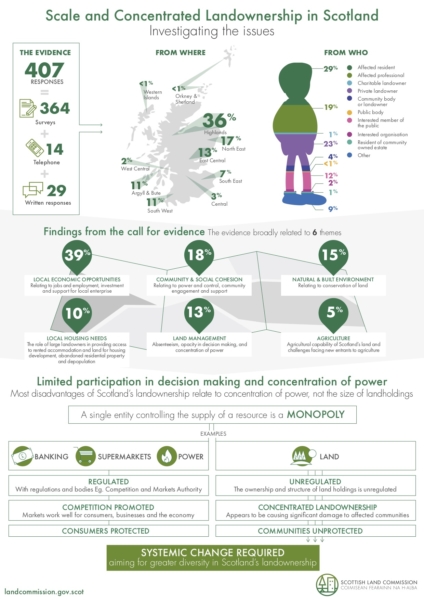Land, Monopoly Power and Systemic Change


Hamish Trench, CEO of the Scottish Land Commission said:
“The evidence we have collected shows clearly that it is the concentration of power associated with land ownership, rather than necessarily the scale of landholding, that has a significant impact on the public interest, for example in relation to economic opportunities, housing and community development. This points to the need for systemic change beyond simply a focus on good management.”


The main findings are that:
- Most of the disadvantages associated with Scotland’s current pattern of land ownership relate to a concentration of social, economic and decision-making power, not simply the size of landholdings
- The advantages identified relate mainly to potential economies of scale
- In some parts of Scotland, concentrated ownership hampers economic development and causes serious and long-term harm to the communities affected
- The problems are not associated exclusively with any particular type of landowner – the Commission found a consistent pattern of evidence relating to land owned across the private, public, NGO and community sectors
- There are issues to address beyond ownership, specifically a lack of effective participation in land use change decisions
- The pattern of market and social power in concentrated land ownership, has parallels with monopoly power in other sectors of the economy
- There is – currently – little or no method of redress for communities or individuals, where there are adverse economic or social impacts.
The report found that about 1,125 owners, including Highland lairds and major public bodies such as Forest Enterprise and the National Trust for Scotland, own 70% of Scotland’s rural land, covering more than 4.1m hectares (10m acres) of countryside.
That includes 87 owners whose holdings total 1.7m ha, with some estates owned by the same family for more than 400 years. Scotland’s two most powerful private landowners – the Danish clothing billionaire Anders Holch Povlsen and his wife Anne; and the Duke of Buccleuch – each own more than 80,000 ha (200,000 acres), spread across multiple properties.
Land campaigner Andy Wightman has called the report: “A vital & timely report that confirms what many of us have been arguing for decades. Hegemonic landed power needs to be eliminated.”
“Land reform has tinkered at the margins for too long…we could be on the brink of resolving the central problem of Scottish land ownership: the centuries-long persistence of hegemonic landed power.”
Among a series of recommendations the commission has called on the Scottish Government to introduce:
- Legal powers to subject large land sales to public interest tests in special cases in order to stop owners having excessive power.
- A requirement for owners of large estates to draw up management plans that involve local communities.
- Powers to investigate cases where landowners abuse their power, which could lead to compulsory purchase or community buyouts.
- New ways to increase the number of small and privately owned estates, farms and forests.
We can expect these modest recommendations to be fiercely resisted.
The consequences for breaking up this monopoly power go way-beyond rural housing and estate management.
It has the potential to have huge consequences for our ecology, breaking up the concentration on hunting, shooting and fishing and the devastating impact this has on vast swathes of Scottish land.
When Bella Caledonia was leaked the information about the financial backers of Scotland in Union, the common denominator about the donations and supporters was the extent to which they represented an old landed elite.
This is landed power. I don’t think people are aware of the extent to which we still live in a society dominated by power elites based on inherited power through land, and the extent to which this filters through to political campaigns, lobby groups, and totemic institutions such as the House of Lords.
A spokesman for the Scottish government said:
“We welcome the SLC’s report and will be working closely with the commission and stakeholders to consider the recommendations in the coming months. We expect that the report will inform how we address long-standing issues caused by the concentration of land power in rural Scotland, to the benefit of local communities.”
The test will be to what extent that’s true.


The most significant item in the report confirms that public sector ownership of land cn be equally corrosive to economic development.
To break up existing g estates will cost a fortune and years of litigation. Instead charge an annual Ground Rent per square metre on all land and property in the private and public sector. If they can’t or won’t pay it they will soon offload the land to others who will steward it better. It won’t cost the public purse either.
With you all the way on AGR. Have been led to believe, that if set at the right level, it would be the only tax that those of us in Scotland would have to pay. Would form the basis of a sound argument for independence.
Bill
Great idea.
Cheers! Keep spreading the message.
Great news. The basic facts reported here have been obvious to anybody that cared to look.
Now the Scottish Government need to get their finger out and first take decisive action to improve the transparency of ownership of land. This needs to be done quickly rather than allowing it to drag on for decades more.
Transparency is the necessary first step to making Scotland’s land useful for all rather than the few who presently hoard it.
The one that I (rightly or wrongly) balked at is the largest private forestry owner, with 13,215 ha. being the Church of England. I’m not even sure I’d be content with the Church of Scotland holding such a large chunk of Scotland for financial gain.
I may be wrong, but I remember fairly recently reading that Church of Scotland was the biggest owner of buildings in Scotland.
An interesting question for Scottish Higher Geography/History students: “500 years ago most land and property in Scotland was owned by the Church, The Crown and a wealthy Aristocracy. To what extent has this pattern changed in our modern democracy of 2019?”
It amazes me that the Danish Povslens are permitted to own so much of Scotland, when non-residents are not permitted to own so much as a flat in Denmark. Bring on a Land Tax ASAP. I understand there is a Land Tax in Denmark. I don’t want to seem antagonistic towards Danes in particular, I don’t consider any ownership by non-residents to be acceptable.
Surely we as a society grant “so called” owners certain privileges. These privileges must involve reciprocal obligations to society. After all, ownership is inevitably transient, land is not.
so after all these years in power, our Holyrood brigade have a report. (wow! a report! even the stray cats in the street knew what the faults were in the historic system.) But I wonder how many years will pass with this report languishing in the long grass? Don`t think this present government has the balls for serious reform and upsetting the Establishment. all brave words and fighting talk.
W.B. “…even the stray cats in the street knew what the faults were in the historic system…”
Problem is, I don’t think the average person in the street DOES make the connection between our medieval pattern of land ownership and the barriers they experience in their own life to prosperity. They never ask; “how come it takes me 25years, and half my disposable income, to buy a 10m x 20m plot of land with £40k worth of (VAT refundable) building materials on it?”
This message really needs hammered home; Concentrated land ownership is killing the prosperity and opportunity of future and past generations of Scots. People need to become aware and angry about their lost opportunities.
If you have a wee bit of land you can:
*Grow food
*Start a business rent free
* Store materials and equipment acquired cheaply & opportunistically because you have space for them
*Generate your own power
*Provide land for your kids to build a home
*Have a holiday rental income from yurts/tents/B&B/outhouses/festivals etc
*Grow firewood & biomass
*Have large family/neighbourhood gatherings
*Enjoy privacy & quiet if you choose it
*Feel rooted and connected to place
*Use bits of your land as capital for future projects
*Live debt-free and independent of exploitative employers
*Make choices about how you use your land to benefit your community
All these things are denied most of us because land is tightly held by a few people and traded as a commodity on an obscenely profitable speculative market.
I agree with you totally. However to reach where we want to be we have to recognise that big land owners have rights too . We do t want years of litigation or to have to pay them for the land in their titles.
The way to achieve change is to charge an annual Ground Rent on all land. In rural settings the rate per square metre should be the same for the same land type. That means that everyone is treated equally. It also means that if the land owner can’t make enough to pay the AGR he will try to sell or offload it. This will release a lot of land .
It’s also necessary for planning departments to be much more progressive in rural areas.
There are various intiatives which could be introduced to encourage rural living and working.
To make land available for housing the Scottish government should grant blanket deemed time limited planning permission for four homesteads on every farm in Scotland. That will reduce the development value of land substantially
I agree Graeme,
There is no point, and it would not be fair, to “go after” large landowners in any kind or vengeful or malign way. It is our current system of ownership and (lack of?) regulation that is at fault here. No need for confiscation or anything so draconian.
A ground rent on land would apply to all people, equally; “Use it or lose it” but you can’t afford to hoard it. Or, if you do, then you pay the public a realistic fee for your privilege.
“Go hard on the issues, but easy on the people.” As someone (Alastair McIntosh?) once said.
Your words are music to my ears, it’s encouraging to see like minded folk out there. Radical land reform is so urgently needed for the evolution of our society and culture.
What worries me about this is not the conclusions, they all make sense to me. It’s the likely response, if that is to move on large scale public land holdings before any action is taken on private land we will end up selling off public land and leaving the real problem untouched.
And the landed interest will happily make this a debate about public land, it will suit them to deflect the spotlight from them.
Public land holdings should be managed responsibly and transparently with local communities central to the process. But public land holdings should also serve a national or regional purpose, there has to be a way of balancing that with local interests.
Which means the rules for public land holdings don’t need to be the same as private land which serves only the aims of personal wealth.
We’ve been fooled once before over “breaking up state monopolies”, let’s not get fooled again.
There is no excuse for government and its agencies not stewarding the land and property they own on our behalf.
All owners must be under the same obligation to steward.
There are thousands of hectares of land in Glasgow which have been left by public agencies for generations where folk could have had decent homes and nice environments. Because there was no pressure on the public agencies like having to pay an AGR to do anything with the land.
You rather make my point.
I don’t disagree but as at 2017 there were a little over 1,060 hectares of vacant or derelict land in Glasgow, only around half these sites in are in public ownership and the total has been falling year on year since at least 2011.
Across the rest of Scotland there are thousands of hectares of land held by the same families for centuries and thousands more traded between the super rich all run for thier personal benefit at the expense of local communities. That should be the main focus for action arising from this report.
This issue of land ownership is at the heart of everything. Land is power, make no mistake.
George Monbiot recently called our current pattern of Land Ownership a form of intergenerational theft:
https://www.monbiot.com/2019/03/18/intergenerational-theft/
LVT is the answer and also to favouring/discouraging land use. Who could possibly object to using market forces to deliver national political objectives?
There is no need for the ‘nanny state’ to ban fracking or opencast coal mining, The banding of LVT land use rates, and additionaly the option to require reserves for reinstatement can do all that is necessary,
Negative LVT rate bands can be employed.
The annual adjustment of LVT rates could be a key landmark in the delivery of government policy.
You could put debates between campainers and interested parties on TV and have the willofthepeople decide whether to increase or decrease the rate for private schools, or set enviromentalists against the shooting estates to make the case of what is in the national interest.
LVT could be fun.
I mean, look at these pictures of Norway….does it look familiar? Could be Highlands of Scotland eh?
Except, nobody lives in our Highlands any more. It’s kept aside for deer, sheep ticks, subsidies and grouse shooting. Geo-technically known as MAMBA (Miles and Miles of Bugger All).
There are people living in the wild, northern landscape of Norway. Actual people. Living, having families and working, making money and living in a beautiful landscape, breathing fresh air. Or, if they live & work in the city, they can meet up in the family Hytte (Bothy) at the weekend because they have 400,000 of them. ( Scotland had about 400 at the last count, nineteen years ago)
Sorry, forgot the link! (dafty):
https://fjordpeaks.com/2019/03/09/2019-week-7/
And that is why they will prevent Independence with every dirty trick in the book.
This is one of the many reasons they seek to prevent Independence. Scotland needs to implement many radical changes; some we could do now many require more powers than we have.
Time to get on and get things done.